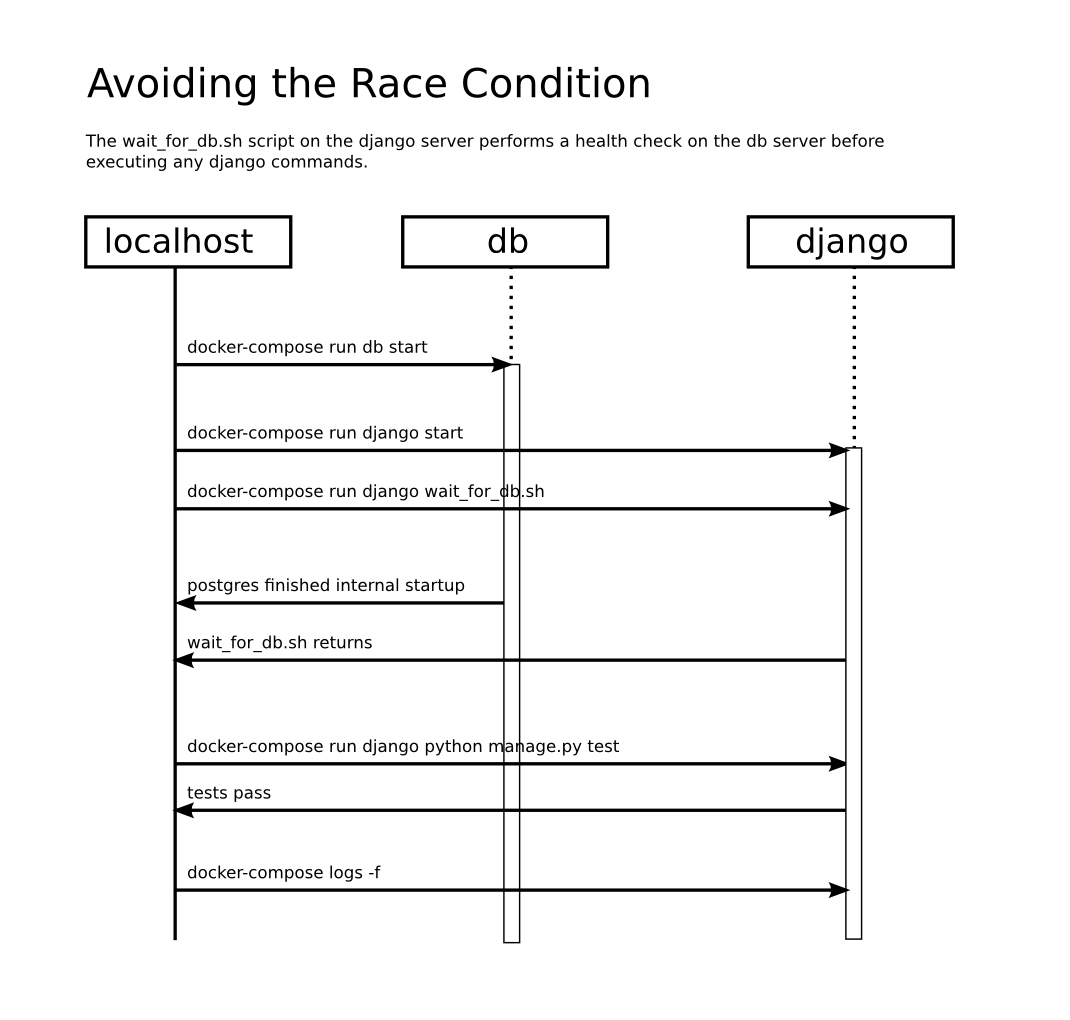24.4.2016
- test-driven
- add-remove components
- exchange components
- documentation(simple)
- one-click-deploy
- 12 Factors (http://12factor.net/)
We use a iterative work process with the following phases:
- Plan the iteration and decide on a test
- Develop whatever there is to develop
- Run in Operations using a one-click installer
- Test the test decided previously
- Document in README.md
All components interact with a git repository.
A server running a Hello World web app.
- Github repo
- Docker
- Django
- Selenium
- virtualenv
- git repo initialized (lenarother/mkr)
- virtualenv set up
- test works and fails
- Docker container created with a single script (Dockerfile)
- make sure to use compatible versions of Selenium/Firefox
- make sure you do not use Python2 on one dev machine and Python3 on the other
- do not try
yes | sudo apt-get install docker
30.4.2016
- get Docker to run by
start_docker.sh
- created Django instance + application via Docker
- docker-compose up creates an image, installs django, attaches local filesystem and starts the server
- the tests passes
- Docker is under heavy development. Make sure you have the latest version, so that the documentation corresponds to your system.
- Docker installation instructions worked nicely
- strange phenomenon on KR's machine: reboot, after the reboot terminals did not start, pressing Ctrl-C resulted in a Python error message connected to virtualenv (maybe because leftovers from previous virtualenv session(s)?? Docker took a long while to start after installation, much longer than on MRs machine.
- it took a while to figure out how to create a Django app in the right folder via docker-compose (with the -w option). It is a bit annoying that files created by docker-compose all belong to 'root'.
1.5.2016
- Add a Postgres database that keeps a table with quotes
- Quotes from the database are highlighted on the web page
- added example quotes by Sun Tzu and test
- added postgres container to docker-compose
- added model, created a migration via docker-compose
- added a view and HTML template to display quotes
- created a data entry manually in a django shell session --> works
-
does not pass the one-click test yet, because we wrote the data entry manually
-
found that docker containers tend to accumulate. You can clean them up with:
docker ps -a | grep 'weeks ago' | awk '{print $1}' | xargs --no-run-if-empty docker rm
docker ps -a | awk '{print $1}' | xargs --no-run-if-empty docker rm
16.5.2016
- more smooth startup according to one-click paradigm
- problem re-occured: when we start docker-compose so that new containers are created, the process fails because postgres creation is overtaken by Django --> Django doesn't find database because it is not ready yet.
- problem solved brute-force by sleeping 10 seconds in container before starting Django
- for more elegant solution wrote shell script that starts services via docker-compose one by one
- added "service health check": shell script on Django container waits for DB to come up
- learned what a 'race condition' is
- the health check could possibly hang in an endless loop if DB server crashes, therefore not too advisable for production
17.5.2016
- build a test that passes without manually adding a DB entry.
- added test for views in django application
- used ORM for adding test data
- used docker-compose to run the test inside the container
- extended shell script to stop containers if tests fail
- three independent sources recommend not using JSON fixtures, but use the ORM or tomboy instead.
- problem: how to write a test fixture that runs inside the Django container when the test runs locally?
- the start_docker.sh script removes all containers on the local machine!
24.5.2016
- Problem: Startup from last session is broken (tests fail). It seems there is still a race condition.
- Add manage command to load quotes into DB
- Create fixtures in container via management command that is used via fabric
- Solution: extra script that tests whether db is up executed before running tests.
- Added parser for quotes
- Added test for the parser
- Added management command to add quotes to DB
- Added test and load functionality via fabric
- Acceptance tests with Selenium PASS
25.5.2016
- add the django-wiki app
- installed Pillow + django-wiki by adding them to Dockerfile
- extended fabfile to connect to Bash + Python in django container
- got the wiki to run (Yay!)
- when Dockerfile changes, images are not rebuilt automatically, you need docker-compose create --build
- needed to 'python manage.py createsuperuser' before logging into the site
- scanned local network with: nmap -sP 192.168.1.0/24
- create superuser automatically from environment var
- add nginx
- create packaged Django app
- package a project for deployment
- add Django admin interface
- make template/view for quotes nicer
- improve documentation
- Jenkins: add CI server that rejects commits with TABs
- does Django cache automatically if you add 1000 entries to the DB or does it send 1000 queries?
- Ansible / Vagrant / OpenStack / Salt
- Logstash / Graphana / Kibana
- Redis
- RabbitMQ
- Celery
- Sentry
